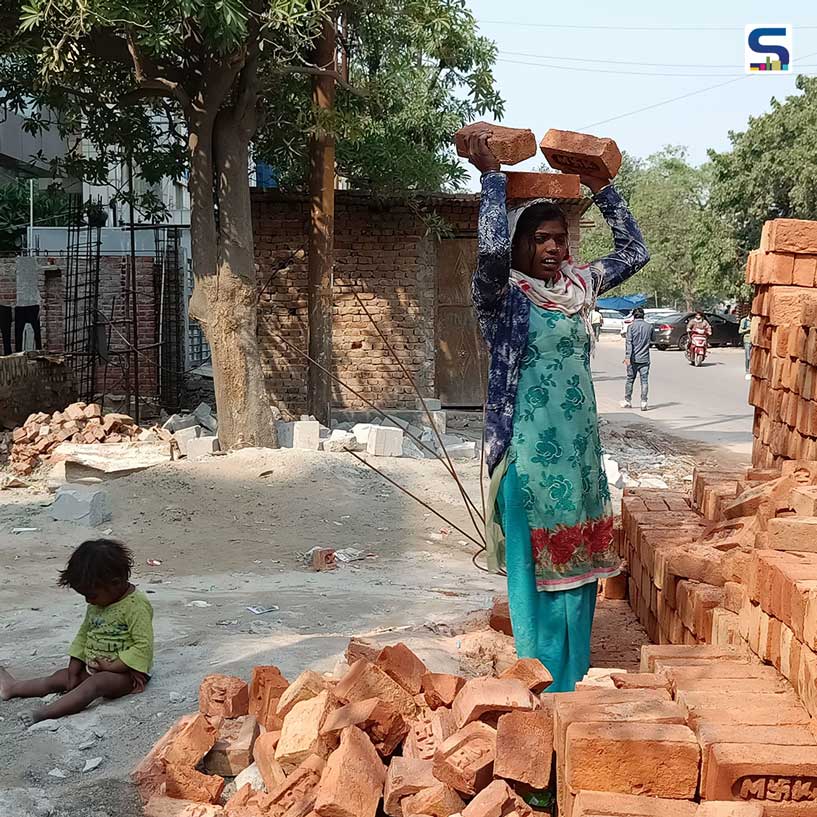
A report released by the World Trade Center and Consulting firm Primus Partners on the current status of Indian women in the construction and real estate industry suggests that informal women construction workers in India earn 30-40 per cent less than their male counterparts. As per the report findings, the hourly wage of women in the construction sector is Rs 26.15, while the men earn Rs 39.95 per hour. Read SURFACES REPORTER (SR)’s complete report below:
The report shows the sharp gender inequality in terms of earnings in the real estate and building sector of India.
The report ‘Pink Collar Skilling: Unleashing the Women's Power in the Real Estate Sector” throws light on the current status of Indian women in the construction and real estate industry.
Key Reasons for Lesser Earnings
There are numerous reasons why women earn less than men in construction and real estate. One of the most prominent reasons is the prevalence of women in lower-paid positions.
The second reason is the discrimination factor which causes the gender pay gap in the industry. Other reasons include passing over for promotions, fewer opportunities to develop their skills, etc.
The above-mentioned are a few reasons why women could not progress in their careers and are paid less than their male counterparts. However, it is vital that these problems need to be addressed on a serious note so that women in these industries would be paid equally for their work, and should have similar chances for career growth as men.
Other Key Findings of the Report
The research says that in the 57 million-person domestic construction and real estate industry, the number of male workers is around 50 million while only 7 million women are employed the same.
“India only has 2 per cent of female executives in construction enterprises as compared to 14 per cent in the UK and 7 per cent in the US”
“There are hardly any women in managerial positions in the Indian real estate sector. Only 1% to 2% of women hold top managerial positions in this sector. The few women working there are hindered by the glass ceiling.”
"Across all industries, there are only about 17.3% of women on corporate boards, although this percentage is substantially lower in the construction industry.”
“Only 1.4% of women worked in other technical and managerial positions (supervisors, civil engineers, architects). Less than 2% of them go on to hold leadership roles.”
“With a 15% pay discrepancy in the industry, women make up 47.6% of licensed architects in India.”
"Women are disproportionately employed in low-paying and dangerous jobs (such as carrying heavy loads), such as those in brick kilns, quarries, slab pouring, stone shaping, load carriers, and assistant positions. These tasks require a lot of labour, have health risks, and pay poorly.”
“The industry with the highest percentage of casual workers is construction, where close to 84 per cent of employees work in this capacity.”
“Women are highly underrepresented, even in mid-level and semi-skilled positions like site managers, contractors, surveyors, carpenters, plumbers, painters, and masons.”
“The labour force in this industry makes up more than 80% of the occupations, with the remaining 20% being filled by technical positions like engineers and secretarial positions.”
“Female employees in this category are in a worse predicament than their male colleagues. They receive reduced pay (Rs 30% less, sometimes less than 40–50%) and frequently only get to work for half the month .”
Suggestions Mentioned In Primus Partners and the WTC report
Aarti Harbhajanka, Co-Founder and Managing Director of Primus Partners shares some of the pathways suggested in the report to close the gender gap in India:
- the national campaign for gender inclusion and overcoming bias
- all-women crew lighthouse housing project
- the scrutinizing of gender equality through RERA
- skilling across levels
- career innovation fund
- Investment funds for women-led real estate companies
- gender-sensitive training
- paying attention to safety and working conditions at construction sites and in operation areas
- priority queue for project approvals for organisations with better performance
Aarti Harbhajanka further estimates that more women will soon be taking up challenging positions in human resource management, finance, administration, sales, and marketing.
Many organizations such as WADE Asia are also working to support women and celebrate women-led developments and achievements. WADE Asia is the world's largest award platform for women architects, interior designers, artists, real estate & construction professionals, and engineers started by Vertica Dvivedi and Madhurima Chowdhury in 2016 to recognie the contribution of women in design, documenting their progression, and giving a grand common platform to women in creative pursuits to meet, network, learn and share.
Bhadri Suthar, Co-Founder and Principal Architect, The Grid Architects, also “The WADE ASIA platform raises emerging women designers to new heights to establish themselves in a patriarchal world. Such opportunities support in filling the gender gap.”
Source: Primus Partners, WADE Asia
Keep reading SURFACES REPORTER for more such news stories.
Join us in SOCIAL MEDIA to stay updated
SR FACEBOOK | SR LINKEDIN | SR INSTAGRAM | SR YOUTUBE
Further, Subscribe to our magazine | Sign Up for the FREE Surfaces Reporter Magazine Newsletter
You may also like to read about:
Omani Student Startup Converts Marble Waste Into Eco-Friendly Products | SR Material Update
Kuwait Unveils Plans for the World’s Tallest Tower | Burj Mubarak al-Kabir
And more...